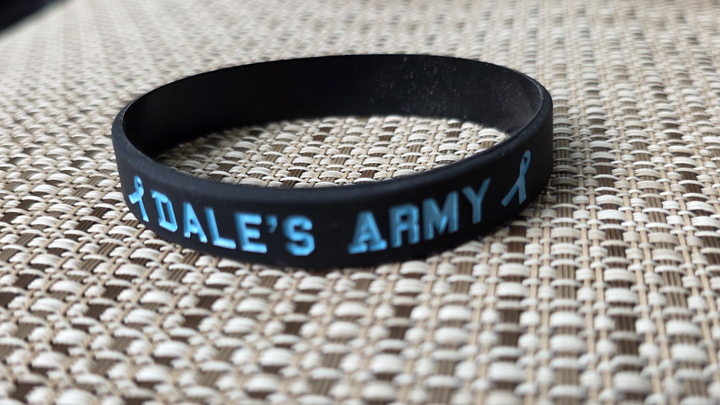
Our Father's Journey: A Third Challenge
Donation protected
Our Father’s Journey
On June 13, 2025, I received the call no one ever wants to get:
“Your brother is taking your dad to the hospital—they think he’s had a stroke.”
After multiple tests, the doctors discovered a mass. The melanoma he had fought years ago had metastasized to his brain.
That same night, he was transferred to Sinai, and his battle began once again. I say “again” because this is his third cancer diagnosis in the past ten years. A man who is kind, loving, laid-back, and hardworking was being tested in ways no one should have to endure. A surgery date was set for June 18, and we were ready to face this challenge together.
Watching the man who taught me everything struggle to form a sentence was heart-wrenching. Aphasia robbed him of his ability to express himself, even as his eyes lit up with recognition. It’s one of the cruelest aspects of brain injury—to see understanding in someone’s face without the words to match.
Surgery day came, and he did wonderfully. He was awake, responsive, walking, and eating. You truly can’t keep a good man down. After two days in the ICU, he was moved to a regular floor, working with physical and occupational therapy, making steady progress toward rehab. Things were looking up.
But as they monitored the post-surgical bleeding, everything changed. Oncology informed us that too much of the tumor remained, and another surgery would be necessary. While they monitored the bleeding and swelling, a week passed—and then the situation took a turn for the worse.
On June 28, my uncle messaged me—Dear was vomiting, disoriented, not eating, and barely responsive. When I arrived at the hospital, he couldn’t recognize me or express how he was feeling. I noticed a cut above his right eyebrow. After some gentle questioning, I learned he had fallen in the bathroom—a terrifying risk after brain surgery.
Despite being classified as a fall risk, with chair alarms in place, he somehow managed to get up, fall, and return to his chair without assistance. The fall wasn’t reported properly, which raised its own concerns, but the focus had to remain on his immediate care.
Due to his worsening mental status, right-sided weakness, and vomiting, his second brain surgery was moved up to July 1. My brother and I stayed with him until he was taken back, and we waited. The surgery itself went well, but as we waited for updates, something felt wrong. When we were finally allowed back, his room was a flurry of urgent activity—doctors giving rapid orders, nurses rushing, scans being pulled up. He was bleeding, and if it couldn’t be controlled, a third surgery would be required.
After several tense hours, the bleeding stabilized. We left that night emotionally and physically drained.
In the early hours of July 2, I received another call. His condition had rapidly declined, and an emergency surgery was needed. I gave consent over the phone, and though the doctor advised us not to rush in, by dawn I was back at the hospital. Nothing prepares you to see your loved one on a ventilator, covered in tubes and wires. My heart broke.
Once the ventilator was removed, hourly neurological checks began. During one of them, I noticed his left leg was discolored. I alerted the staff, and a Doppler scan revealed a massive blood clot stretching from his mid-thigh to his knee. He underwent an urgent procedure to insert a filter to prevent potential embolisms since blood thinners were not an option following recent brain surgery.
The following days were a rollercoaster of scans, tests, and unanswered questions. Despite significant right-sided weakness and unexplainable symptoms, we held onto hope. On July 4, he was moved from ICU to a step-down unit.
July 6 brought new challenges: he began vomiting blood, his blood pressure skyrocketed, and no treatments were effective. An endoscopy was scheduled to search for the cause.
On July 7, despite the physical exhaustion, he managed to have his endoscopy, another EEG, and a radiation mask fitting. Miraculously, the source of the bleeding could not be found—something for which we were grateful. By evening, he was utterly drained.
July 8 and 9 were much the same. Fatigue dominated his days, but he showed determination during therapy sessions. Though his right side was weak, his eyes showed understanding and his will remained intact, even when his body wouldn't cooperate.
If you’ve read this far, we sincerely thank you for walking this journey with us. This man is our entire world—a father, a role model, a fighter.
As you can imagine, the medical bills are mounting. He is on a single income, and the financial strain is overwhelming. Asking for help is not easy for us, but right now, we have no other choice. Any assistance you can offer—whether financial, emotional, or simply through sharing this story—would mean everything to our family.
Thank you from the bottom of our hearts.
Organizer
Kim Becker
Organizer
Taneytown, MD